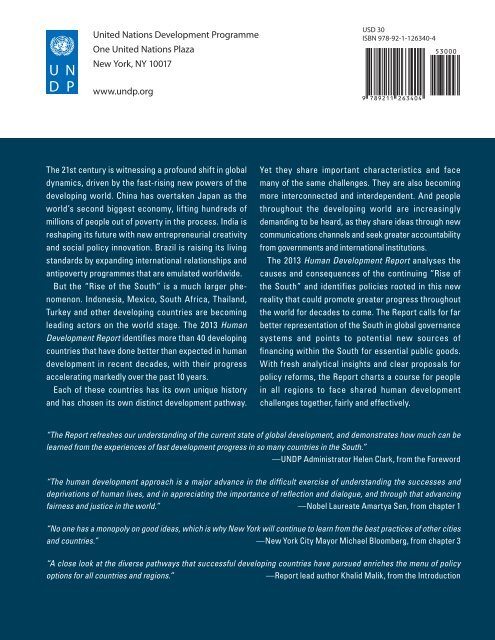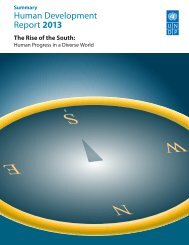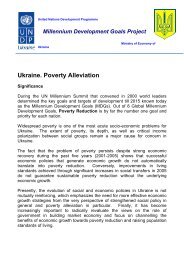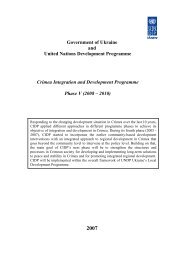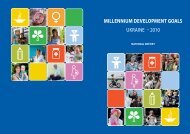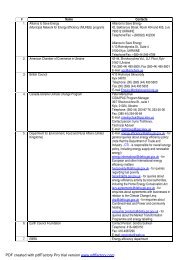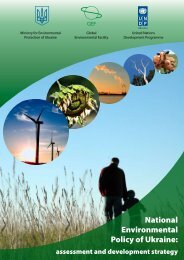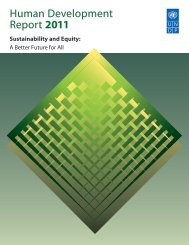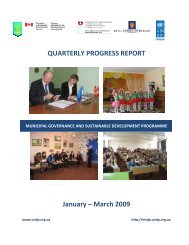E N S W - United Nations Development Programme
E N S W - United Nations Development Programme
E N S W - United Nations Development Programme
You also want an ePaper? Increase the reach of your titles
YUMPU automatically turns print PDFs into web optimized ePapers that Google loves.
<strong>United</strong> <strong>Nations</strong> <strong>Development</strong> <strong>Programme</strong><br />
One <strong>United</strong> <strong>Nations</strong> Plaza<br />
New York, NY 10017<br />
USD 30<br />
ISBN 978-92-1-126340-4<br />
www.undp.org<br />
Empowered lives.<br />
Resilient nations.<br />
The 21st century is witnessing a profound shift in global<br />
dynamics, driven by the fast-rising new powers of the<br />
developing world. China has overtaken Japan as the<br />
world’s second biggest economy, lifting hundreds of<br />
millions of people out of poverty in the process. India is<br />
reshaping its future with new entrepreneurial creativity<br />
and social policy innovation. Brazil is raising its living<br />
standards by expanding international relationships and<br />
antipoverty programmes that are emulated worldwide.<br />
But the “Rise of the South” is a much larger phenomenon.<br />
Indonesia, Mexico, South Africa, Thailand,<br />
Turkey and other developing countries are becoming<br />
leading actors on the world stage. The 2013 Human<br />
<strong>Development</strong> Report identifies more than 40 developing<br />
countries that have done better than expected in human<br />
development in recent decades, with their progress<br />
accelerating markedly over the past 10 years.<br />
Each of these countries has its own unique history<br />
and has chosen its own distinct development pathway.<br />
Yet they share important characteristics and face<br />
many of the same challenges. They are also becoming<br />
more interconnected and interdependent. And people<br />
throughout the developing world are increasingly<br />
demanding to be heard, as they share ideas through new<br />
communications channels and seek greater accountability<br />
from governments and international institutions.<br />
The 2013 Human <strong>Development</strong> Report analyses the<br />
causes and consequences of the continuing “Rise of<br />
the South” and identifies policies rooted in this new<br />
reality that could promote greater progress throughout<br />
the world for decades to come. The Report calls for far<br />
better representation of the South in global governance<br />
systems and points to potential new sources of<br />
financing within the South for essential public goods.<br />
With fresh analytical insights and clear proposals for<br />
policy reforms, the Report charts a course for people<br />
in all regions to face shared human development<br />
challenges together, fairly and effectively.<br />
“The Report refreshes our understanding of the current state of global development, and demonstrates how much can be<br />
learned from the experiences of fast development progress in so many countries in the South.”<br />
<br />
—UNDP Administrator Helen Clark, from the Foreword<br />
“The human development approach is a major advance in the difficult exercise of understanding the successes and<br />
deprivations of human lives, and in appreciating the importance of reflection and dialogue, and through that advancing<br />
fairness and justice in the world.” —Nobel Laureate Amartya Sen, from chapter 1<br />
“No one has a monopoly on good ideas, which is why New York will continue to learn from the best practices of other cities<br />
and countries.” —New York City Mayor Michael Bloomberg, from chapter 3<br />
“A close look at the diverse pathways that successful developing countries have pursued enriches the menu of policy<br />
options for all countries and regions.” <br />
—Report lead author Khalid Malik, from the Introduction


